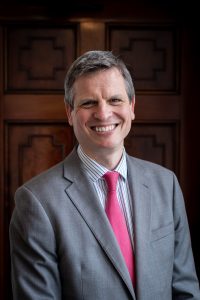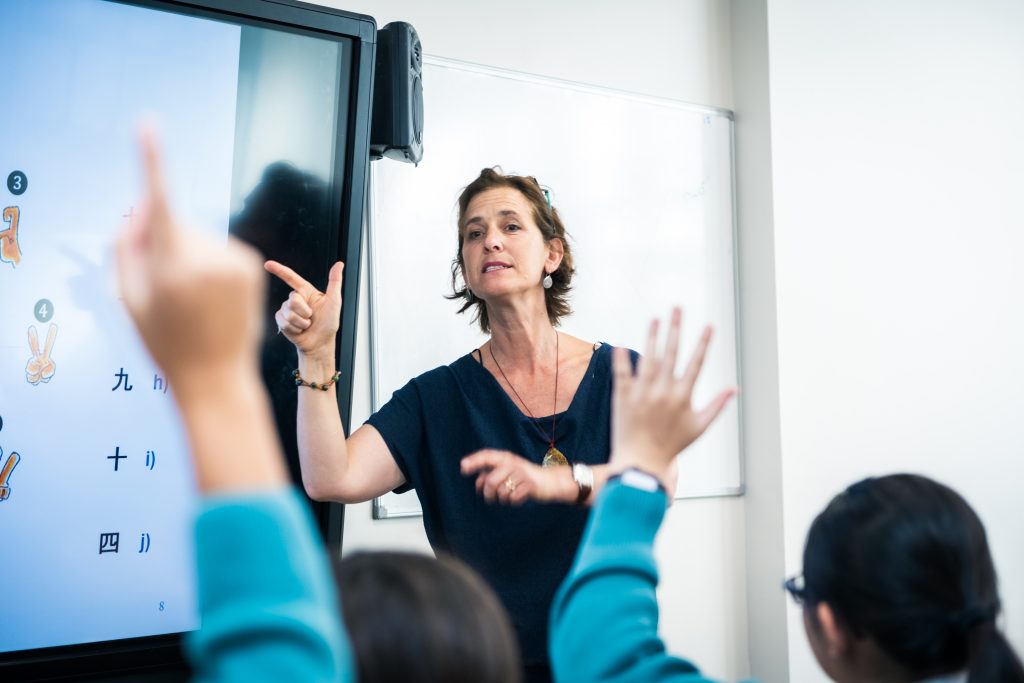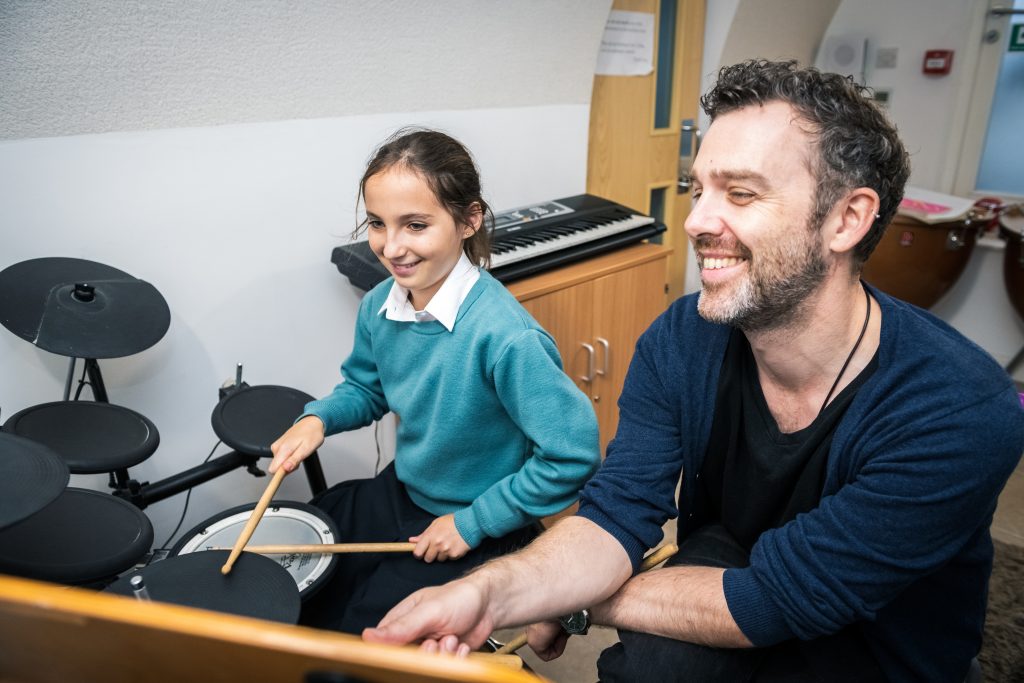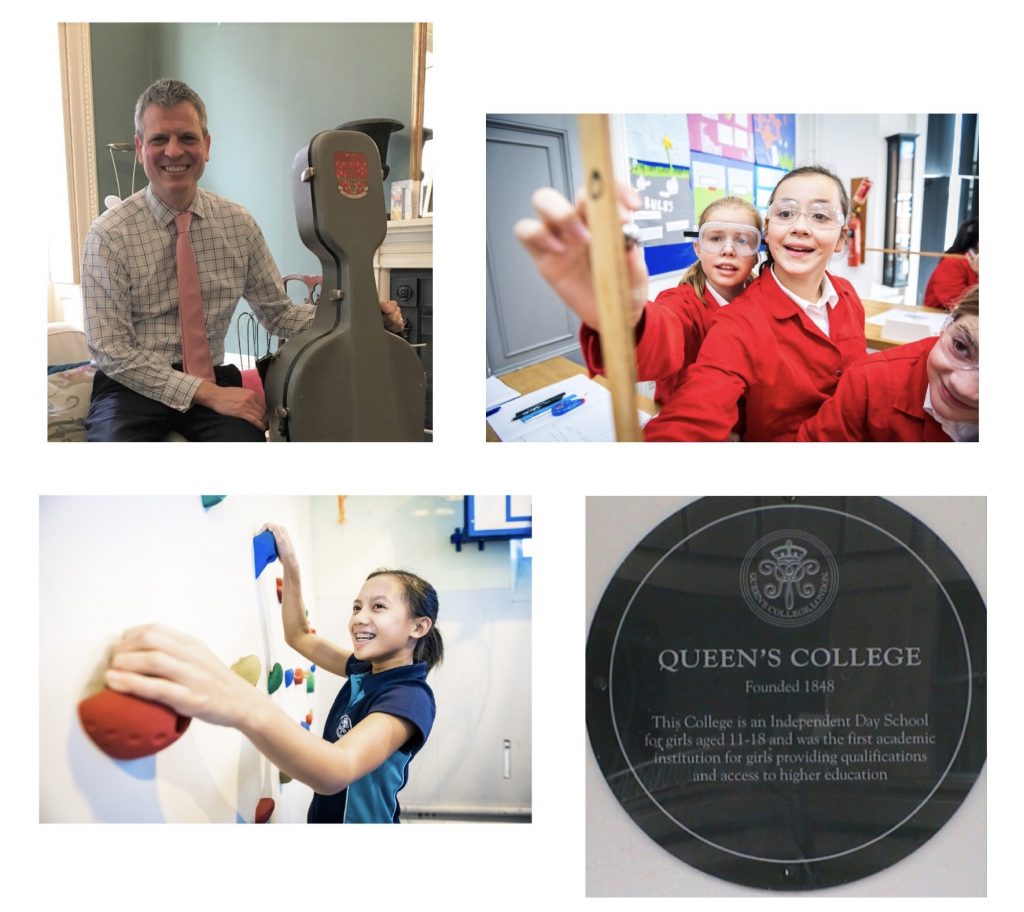
Richard Tillett of QCL
A Cambridge graduate, Richard’s teaching career has seen him work in both co-ed and single sex schools. He has been Head of Queen’s College in Marylebone since September 2017 and took up the position of overall Head of Queen’s College Prep School and Queen’s College in September 2020.
What attracted you to the headship at Queen’s College?
That was the first question I got in my interview for the job and I will give you the same answer I gave the Governors: ‘It is the fit.’ It felt like a school where I could both belong and make a difference.
I love the size of the school; it’s small enough that I can know every child and most of the families. It is also big enough that it has huge amounts going on; dozens of music ensembles and sports teams, plays, over 70 clubs … everyone can find opportunities here.
The history of the place was incredibly exciting. I’m a history and politics teacher. The idea of being somewhere that’s such a ground-breaking institution in women’s education was very appealing.
The culture and feel of it too. The pupils who showed me around once I got to actually step inside were delightful; they were much wiser and worldlier than what I was used to, and I thought they would be an incredibly interesting, diverse, well-rounded and articulate group of young people to work with.
You mentioned feeling like you could make a difference. Please tell us more about that and what you have done so far.
There were structural things that I immediately felt could change. They say never to change anything in your first year of stewardship and I completely ignored that! The first thing I did was to introduce a house system which didn’t exist and which I felt was really missing. When you only have about 60 pupils in a year group, it is a great shame not to have much interaction with the other year groups. A house system is a very easy way of achieving that; you can have house competitions with everybody from the school vertically who are in your house. That also helps create vertical friendships.
I also changed the 6th Form programme. We were still doing what to me was a very outdated model of 4 A-levels for the first year and then 3 A-levels in the second year. That first year 4th A-level amounts to an 8th of curriculum time and it was effectively a wasted learning opportunity that didn’t lead to any qualifications, so instead I introduced the Extended Project Qualification and next year we are bringing in a range of alternatives to that, because it is a very demanding qualification which doesn’t always suit all pupils’ learning styles.
The other change I made in my first term was to move sports from Regent’s Park to Paddington Recreation Ground. You can get fresh air in Regent’s Park but you can’t really do proper sports there. You need decent facilities; you need a running track for athletics, you need astro turf for hockey and so on, and Paddington Rec has got that.
What do you think makes Queen’s College stand out?
The sense of community, but also something a little bit more subtle than that. I came from a school which was quite different from Queen’s, in another part of the country. Our academic results’ trajectory and the academic outcome of the school are things that parents in London primarily focus on, understandably and rightly so, and that took me a little while to get my head around.
But I decided quite early on that you can have the best of both worlds; you can have strong academic results without sacrificing this sense of community. And, the kinder you are, the harder you can push in a sense. The more comfortable a pupil feels, the better they will do. We have created this community of kindness, support and, actually, love. We are less narrowly selective than some of our competitors but our results stand comparison with theirs because of how we go about it. I think that makes us unique.

Lockdown is continuing to disrupt exams this year; you have committed, as other schools in the London 11+ Consortium have, to the ISEB. Do you think this is the right format for the future? Will there be a bigger emphasis on raw intelligence in the future?
What I know will only last one year is interviewing on Zoom! I absolutely want to meet these children in the flesh, which we can’t do this year. They and we are both missing out on something very important by not being able to meet in person.
The difference between ISEB and the 11+ Consortium test is minimal; the main difference between them is where they take place, not actually what the pupils are tested on. The two tests are very similar, with a multiple-choice format, testing raw cognitive ability, so the change you refer to has really already taken place.
This year the London 11+ Consortium has split up into 8 of us doing the ISEB test and 6 sticking to the Consortium test, but we fully intend to reunite next year. Given the situation, we as individual heads took our own decision as to whether we felt able to run the test as usual in January in our own schools or not. I felt that given we have over 100 feeder schools, the need for social distancing and bubbles combined with the way our school is laid out would be challenging and I felt doing the ISEB was the best practical thing to do this year; not because it is a better test. In a year’s time when hopefully this will all be over, I expect that we will go back to the old process.
The actual test will always be the most important element of the 11+ process in London, and cognitive ability will always be the key. I can’t ever see it going back to how it was, with a creative writing element for example, because to me it entrenched inequality; it was possible, sadly, to pay for private tutors to tell you how to write prose ‘creatively’ and you come out with a hundred essays that are all very similar and that doesn’t give you a fair judgement of the child. So, I think that a test more based on ability is much better and much fairer; you can actually see where that child is at in terms of their natural ability. And make a better judgement about which school is right for them. It takes away a lot of power from the parents and many are very anxious about it, and I understand why, because we are taking the control away from them. But ultimately it is about the young people and about what is fair for them more than about the parents.
I do think, though, that the interviews will gradually take on a bit more importance. We use them mostly to judge character and personality; if we feel it would be the right fit. At Queen’s we interview everyone who applies without knowing the test results. A good thing about being a fairly small school is that while it takes more time, I do like also to pick up the phone and call the head of the feeder school as much as I can to try to get a rounded picture of the candidate and combine that with how they performed in the test and interview. And it gives plenty of scope for those softer aspects to be picked up on.

You are now in your fourth year. What do you view as your biggest achievement so far?
The main thing that I am proud of is creating a sense of community. We are all in it together, we have a common purpose and know what we are doing. We essentially have the same philosophy and there is a real sense of camaraderie.
Do you think some of the changes from lockdown are here to stay?
We may look at keeping parent teacher evenings online or at least have the option of in-person or online given how challenging it can be to come into school for working parents. We may run some other events remotely, if there is a trip coming up and the parents need a quick briefing for instance. But anything that involves the pupils needs to be in person. This term has clearly shown that young people need to physically be in school. They need the routine, the sense of togetherness, and they need that human contact.
How do you see your role working with the newly appointed headmistress of your junior school Queen’s College Prep School?
Laura has made the most fantastic start and she is absolutely brilliant. I am now the head of the overall organisation, so strictly speaking I am her boss. But I am trying not to interfere at all. I am secondary trained and my whole experience is in secondary. She is the primary expert. I am here as a backup and someone to bounce ideas off.
There are lots of opportunities for both schools to work together, from us providing some specialist teaching like Art History and Classics to things on the pastoral side. The prep school made kindness stones for us, for example, and in turn we will make kindness stones and bring them over to the girls in the prep school. There is also the social aspect: the younger girls really look up to the older ones and we will create opportunities for the older pupils to go over there and perform, take part in assemblies and so on.
We don’t want to put the prep school girls through the 11+ process if they want to come to Queen’s, so if they have met the academic criteria based on data from Year 4 and Year 5, they can come here without having to sit the 11+. Some will still need to sit the 11+ if they haven’t made the academic threshold, but the vast majority will be able to take that automatic offer.
Tell us more about your bursary scheme and why you feel it is so important.
I am absolutely passionate about this topic. I think independent schools have a moral duty to give back to people who are less privileged. But I also think there is a very strong educational argument for a bursary scheme – and the figure I have in my head is 10% of free places – and I am absolutely convinced that if we are to achieve that in three years, which is the target I have set, we are transforming the lives of those 10%, but we are also massively helping the other 90%.
This is because we are introducing them to people from other parts of life that they otherwise maybe would never have met, they never would have worked with or become friends with. You cannot live your life in a bubble. You cannot surround yourself only with people of a certain background and therefore, the more diverse a background all our pupils get exposed to, the better equipped they will be in life. The bursary scheme is a fundamental part of introducing that element of diversity.

We know you are both a big Arsenal fan as well as an accomplished cellist. What can we learn from what happens on the football pitch as well as what takes place when playing the cello in a concert and extrapolate into the classroom?
It is about team work. I played the cello a lot growing up and took part in many string quartets. Unless the four of you in a string quartet are working together, the whole thing falls apart. Likewise, in a football team, you have the captain of the team and you might have the best player in the team, but unless they are playing with the rest of the team, you are not going to win. I might be the captain of the staff, but I am only one part of it and I know perfectly well that there are people much better at lots of aspects of this than I am. Acknowledging that you are part of something bigger, accepting that you are part of a team, allowing everyone in that team to develop their strengths and contribute even if they are better than you at something; those are incredibly important skills. You have to trust your team and create that unity.
What do you think are the biggest challenges as well as positive aspects of being a male Head in an all girls’ senior school?
Actually, I think it can be quite powerful being a male head in an all girls’ school. Men can be feminist too; they can believe in equal rights and want to promote women’s equality. Just the other day I was teaching a ‘Thrive’ lesson on the advertising industry; we discussed how airbrushed the images of women often are, particularly in cosmetics and fashion ads, and how that insidiously stresses the importance of beauty while at the same time presenting an unattainable image of it, which is very damaging to girls growing up. These points, coming from a man, may perhaps even have had more impact than from a woman. In the same way, during our failure week, I talked to them about when I got things wrong in my life, when I didn’t get that job, when I made a stupid mistake. The message that failing and being vulnerable is ok and is part of life is a message that can sometimes be more powerful when coming from men, who stereotypically are always meant to talk themselves up and put a brave face on things.



